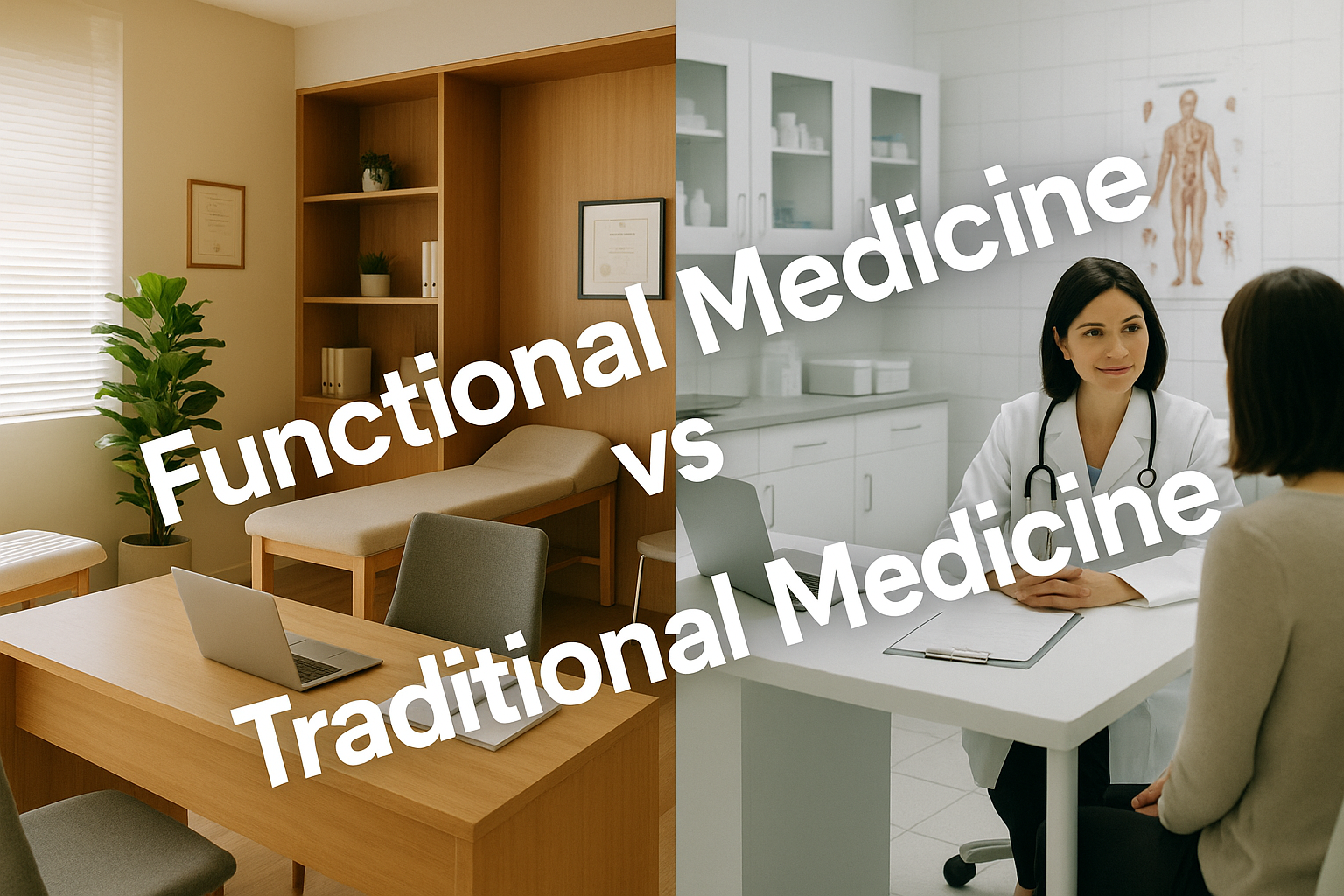Functional Medicine vs. Traditional Medicine: What’s the Difference and Which One Is Right for You?

Functional Medicine vs. Traditional Medicine: A Side-by-Side Comparison
If you’ve ever felt like something was off with your health—only to be told “your labs are normal”—you’re not alone. This frustrating experience often leads people to explore new healthcare models. One of the fastest-growing? Functional medicine.
But what exactly is the difference between functional medicine and traditional (conventional) medicine? And how do you know which one is right for your specific concerns?
At Sheen Vein & Cosmetics, we blend the best of both worlds. In this blog, we’ll walk you through how functional and traditional medicine compare, where each excels, and how a root-cause approach may help you finally find answers when standard care falls short.
Traditional Medicine: Disease Diagnosis and Management
Traditional medicine—also called conventional or allopathic medicine—is the dominant healthcare model in the U.S. It’s what most people are familiar with: primary care, specialists, urgent care, hospital systems, and pharmaceuticals.
Core Features:
- Focus: Diagnosing and treating disease
- Tools: Medications, surgeries, diagnostic testing
- Visits: Short (often 10–15 minutes)
- Approach: Reactive—treats symptoms after they appear
- Strengths: Emergency care, infections, trauma, acute illness
Example:
If you go to your doctor with high blood pressure, you’ll likely be prescribed a medication to lower it—without a deeper discussion about root causes like inflammation, nutrient deficiencies, or stress.
SEO Keyword: traditional medicine model
Functional Medicine: Treating the Root Cause of Disease
Functional medicine is a patient-centered, systems-based approach that seeks to identify why dysfunction is happening in the first place. It focuses on prevention, personalization, and restoring balance in the body’s interconnected systems.
Core Features:
- Focus: Root cause resolution and optimal function
- Tools: Nutrition, lifestyle, advanced lab testing, natural therapies
- Visits: Longer consultations (30–90 minutes)
- Approach: Proactive and preventative
- Strengths: Chronic illness, autoimmune disease, hormone imbalance, fatigue, gut issues
Example:
A functional medicine provider addressing high blood pressure might investigate:
- Gut microbiome imbalances
- Blood sugar regulation
- Mineral deficiencies (magnesium, potassium)
- Sleep quality and stress
- Inflammation and toxin load
Then they would design a tailored plan to reverse these triggers through diet, lifestyle, and natural support—often without medication.
SEO Keyword: functional medicine approach
Side-by-Side Comparison Chart
FeatureTraditional MedicineFunctional MedicineGoalDiagnose and treat diseaseIdentify and address root causesVisit Time10–15 minutes30–90 minutesApproachReactivePreventative and proactiveToolsDrugs, surgery, labsNutrition, labs, lifestyle, supplementsFocusSymptoms and organsSystems and underlying dysfunctionIdeal ForAcute illness, injuryChronic illness, fatigue, autoimmuneTreatment PlanOne-size-fits-mostPersonalized and holistic
When Traditional Medicine Works Best
There is tremendous value in traditional medicine, especially for:
- Emergency care (heart attacks, trauma, infections)
- Specialist care (surgeries, oncology, cardiology)
- Life-saving drugs (antibiotics, insulin, blood thinners)
- Monitoring critical labs and vitals
If your appendix ruptures, you need a surgeon—not a supplement. Functional medicine is not a replacement for acute care; it complements it by optimizing long-term wellness.
When Functional Medicine Shines
Functional medicine excels in areas where conventional medicine often struggles, such as:
- Autoimmune conditions (like lupus, RA, Hashimoto’s)
- Chronic fatigue and fibromyalgia
- IBS, SIBO, and other gut dysfunction
- Hormone imbalances (thyroid, PCOS, menopause)
- Weight resistance and metabolic syndrome
- Long COVID, brain fog, and inflammation
- Mental health support tied to nutrient or gut-brain issues
Instead of masking symptoms with medications, functional medicine works to reverse the underlying dysfunction—so the symptoms naturally resolve.
Why People Are Turning to Functional Medicine
More and more patients are choosing functional medicine because they’re tired of:
- Being told “everything looks normal” when they don’t feel well
- Taking medications with side effects but no resolution
- Seeing multiple specialists without coordination
- Not getting answers to why they feel off
They want more time, more answers, and more personalized care. Functional medicine offers exactly that.
Can You Combine Both?
Absolutely. The future of medicine lies in integrative care—where traditional and functional approaches work together.
At Sheen Vein & Cosmetics, we:
- Order traditional labs and advanced functional testing
- Use medications when needed, but always seek to reduce dependency
- Support healing through nutrition, movement, sleep, and stress management
- Educate patients so they understand what’s happening in their bodies
- Address the whole person—not just the diagnosis
Final Thoughts: Choose the Approach That Empowers You
If you’ve felt dismissed, misdiagnosed, or stuck in symptom management, it may be time to explore functional medicine. You don’t have to choose between conventional and holistic—you can have the best of both.
The key is this: You deserve a health plan that goes deeper, listens longer, and is tailored to YOU.
Ready to Discover the Root Cause of Your Symptoms?
At Sheen Vein & Cosmetics, our functional medicine consultations dig deeper to uncover what traditional medicine often misses. Whether you’re battling fatigue, inflammation, gut issues, or hormone imbalance, we’ll help you get clarity—and build a real plan to heal.
Schedule your consultation today and take back control of your health.